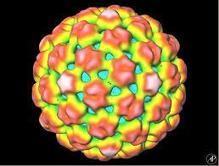Research and publish the best content.
Get Started for FREE
Sign up with Facebook Sign up with X
I don't have a Facebook or a X account
Already have an account: Login
Topical news snippets about viruses that affect people. And other things. Like Led Zeppelin. And zombies B-)
Curated by
Ed Rybicki
 Your new post is loading... Your new post is loading...
 Your new post is loading... Your new post is loading...
|
|












And for all you folk out there who get taken in by headlines such as "Rogue gene in maize kills mice!".